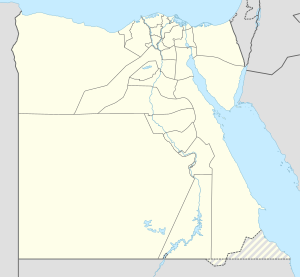Al-Qata'i
| Al-Qata'i | |
|---|---|
| Location in Egypt | |
| Coordinates: 30°01′N 31°14′E / 30.017°N 31.233°ECoordinates: 30°01′N 31°14′E / 30.017°N 31.233°E | |
| Country |
|
| Time zone | EST (UTC+2) |
| • Summer (DST) | +3 (UTC) |
Al-Qaṭāʾi (Arabic: القطائـع) was the short-lived Tulunid capital of Egypt, founded by Ahmad ibn Tulun in the year 868 CE. Al-Qata'i was located immediately to the northeast of the previous capital, al-Askar, which in turn was adjacent to the settlement of Fustat. All three settlements were later incorporated into the city of al-Qahira (Cairo), founded by the Fatimids in 969 CE. The city was razed in the early 10th century CE, and the only surviving structure is the Mosque of Ibn Tulun.
Each of the new cities was founded with a change in the governance of the Middle East: Fustat was the first Arab settlement in Egypt, founded by Amr ibn al-A'as in 642 following the Arab conquest of Egypt. Al-Askar succeeded Fustat as capital of Egypt after the move of the caliphate from the Umayyad dynasty in Damascus to the Abbasids in Baghdad around 750 CE.
Al-Qata'i ("The Quarters") was established by Ahmad ibn Tulun when he was sent to Egypt by the Abbasid caliph to assume the governorship in 868 CE. Ibn Tulun arrived with a large military force that was too large to be housed in al-Askar. The city was founded on the Gabal Yashkhur, a hill to the northeast of the existing settlements that was said to have been the landing point for Noah's Ark after the Deluge, according to a local legend.
Al-Qata'i was modelled to some degree after Samarra in Iraq, where Ibn Tulun had undergone military training. Samarra was a city of sections, each designated for a particular social stratum or subgroup. Likewise, certain areas of al-Qata'i were allocated to officers, civil servants, specific military corps, Greeks, guards, policemen, camel drivers, and slaves. The new city was not intended to replace Fustat, which was a thriving market town, but rather to serve as an expansion of it. Many of the government officials continued to reside in Fustat.
...
Wikipedia

